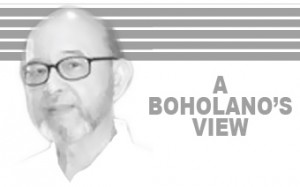 For this column I draw very heavily from the extraordinary efforts and effectiveness of the Ateneo School of Governance (ASOG) and PODER. The head of ASOG is Dean Tony La Viña.
For this column I draw very heavily from the extraordinary efforts and effectiveness of the Ateneo School of Governance (ASOG) and PODER. The head of ASOG is Dean Tony La Viña.
According to the Ateneo de Manila School of Governance, the reform-oriented legislative process is the weakest link in the reform efforts of the Aquino Administration. This was emphasized in the conference it held on March 8, 2016. “one glaring weakness is its inability to pass key pieces of legislation crucial in making reforms irreversible and in turning good governance a norm.â€
“In particular, these key legislative agenda include: the Freedom of Information (FOI) law, electoral and party reform legislation, the anti-dynasty law, the Alternative Minerals Management Bill, to name a few included in the Citizen Reform Agenda 2010.â€
A Reproductive Health Law was passed, but it has yet to be implemented.
The Bangsamoro Basic Law that aims to solidify the peace agreement between the government and Moro Islamic Liberation Front (MILF) was not passed.
What are the codes and laws that are due for review and amendments? The Conference cited the Local Government Code (to deepen decentralization), the Administrative Code (to limit the powers of the presidency), and different electoral laws (to strengthen campaign finance regulations ensuring truly competitive elections).
According to the Ateneo School of Government, “these key pieces of legislation are crucial because they can correct the systemic flaws in our politics and governance that perpetuate the never-ending symptomatic problems and issues that the government and civil society end up addressing perpetually. Politics and governance in the country has become nonstop fire-fighting and trouble-shooting, where we only get to address the symptoms, but not the real causes.â€
“There seems to be no progress in the reform process in achieving substantive change that addressed inequality and social injustice though efforts are countless, non-stop and vigorous as ever. One crucial proposition worth reflecting on is whether the reform momentum remains a fluke and good governance practices continue to be sheer exception to the rule of bad governance in the country because the laws and policies that effect change in institutions and structures are never realized.â€
The failure in passing key reform legislation, while not entirely the fault of the Aquino Administration, was a hurdle in its reform effort that the Aquino Administration was unable to overcome. There are many factors that come into play, particularly pointing to the weak and dysfunctional Congress and executive-legislature relationship.
The legislature is considered the “cornerstone” of democracy. It supposedly houses the “representatives” of the people and serves as the venue for the deliberation of issues for consensus-building and “authoritative allocation of values” in society. Yet, the Philippine Legislature is composed mainly of individuals coming from the richest families in the country. “Proposed legislations are deliberated not on the basis of evidence and sound arguments, but on perks and wheeling and dealing. There are hardly any proactive measures undertaken to make the performance of the House of Representatives and the Senate transparent and accountable. Civil society engagement in the policy process is dispersed and unable to sustainably cover the entire process of policy making and implementation.â€
The 4th PODER/ G-Watch National Conference on the State of Citizen Reform Agenda with the theme “Reform-Oriented Legislative Process: The Weakest Link in the Reform Efforts of the Aquino Administration?” looked at this key gap in realizing the reform agenda. This yearly conference that started in 2013 tracked the performance of the government on the Citizen Reform Agenda 2010 crafted by PODER in 2010.
For this year, PODER (1) “made a general scan of the performance of the Aquino Administration in realizing the reform agenda based on consultations conducted by various groups to further investigate the proposition of the Conference; (2) reviewed how and why the key legislative reform agenda did not prosper as well as recheck the relevance of these agenda in the coming years under the new administration. (3) Finally, it explored best to improve the legislative-making process in the country, looking into ways and means to improve executive-legislative coordination and interface, enable political parties to support programmatic lawÂmaking, make Congress more transparent and accountable, elect more effective, ethical and empowering members of Congress, link policy advocacy and monitoring and frame and organize a more sustained and effective involvement of civil society and social movements in this reform process.â€
I would add that President B.S. Aquino III has been against Charter change. He did not support the initiative of Speaker Belmonte to amend the constitutional provision restricting foreign investments and leaving it to Congress to liberalize foreign investments. (By Jose “Pepe†Abueva)
